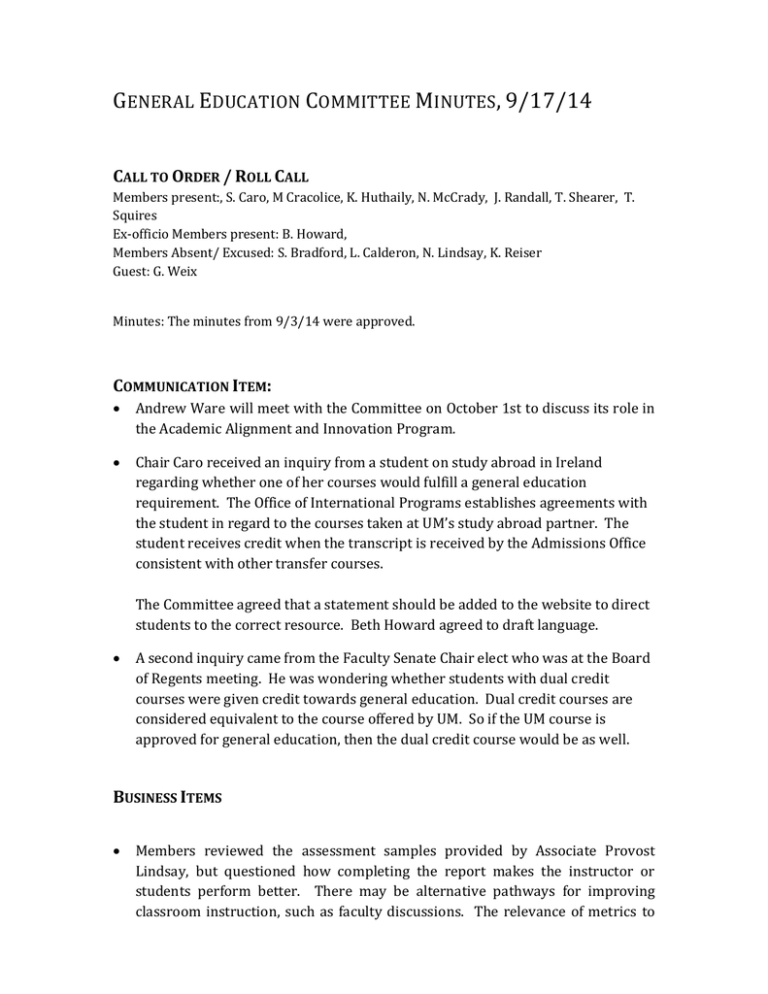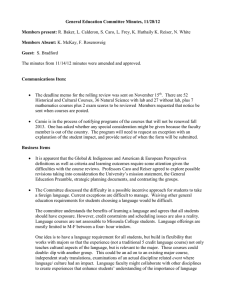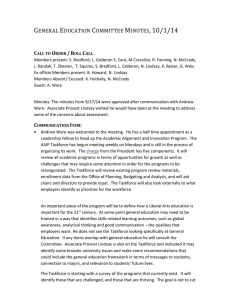G E C M
advertisement

GENERAL EDUCATION COMMITTEE MINUTES, 9/17/14 CALL TO ORDER / ROLL CALL Members present:, S. Caro, M Cracolice, K. Huthaily, N. McCrady, J. Randall, T. Shearer, T. Squires Ex-officio Members present: B. Howard, Members Absent/ Excused: S. Bradford, L. Calderon, N. Lindsay, K. Reiser Guest: G. Weix Minutes: The minutes from 9/3/14 were approved. COMMUNICATION ITEM: Andrew Ware will meet with the Committee on October 1st to discuss its role in the Academic Alignment and Innovation Program. Chair Caro received an inquiry from a student on study abroad in Ireland regarding whether one of her courses would fulfill a general education requirement. The Office of International Programs establishes agreements with the student in regard to the courses taken at UM’s study abroad partner. The student receives credit when the transcript is received by the Admissions Office consistent with other transfer courses. The Committee agreed that a statement should be added to the website to direct students to the correct resource. Beth Howard agreed to draft language. A second inquiry came from the Faculty Senate Chair elect who was at the Board of Regents meeting. He was wondering whether students with dual credit courses were given credit towards general education. Dual credit courses are considered equivalent to the course offered by UM. So if the UM course is approved for general education, then the dual credit course would be as well. BUSINESS ITEMS Members reviewed the assessment samples provided by Associate Provost Lindsay, but questioned how completing the report makes the instructor or students perform better. There may be alternative pathways for improving classroom instruction, such as faculty discussions. The relevance of metrics to specific courses will be inconsistent. The best method of assessment comes from the classroom itself. The Committee should trust the instructor to choose the method that best aligns with the course content. Crafting assessment reports for each general education course seems onerous especially when the individual completing the general education forms may not be the actual course instructor. This requirement would be a disincentive for faculty to teach general education courses. Currently teaching general education courses is voluntary. The only incentive is the possibility of higher enrollment because students need to fulfill a requirement. It would be difficult to show that the time faculty spend documenting the course assessment will have a positive impact on students. The University-wide Program-level Writing Assessment is a good model for assessing skills based general education, but it is very time intensive. Getting faculty together that teach the various groups could be beneficial. This could be linked to the rolling review, but the administration would need to provide funding for training / development workshops. The attendees could create the materials for distribution to the general education instructors for that specific group. This structure may make the conversation more meaningful. The roll of the Committee is to advocate on the behalf of faculty to improve teaching in a way that is not an undue burden. It was suggested that the Committee develop materials for department chairs to provide to instructors of general education courses. The forms could be a training tool that outlines expectations of the course for the instructor. Everyone teaching a general education course could get the approved form and an explanation of the obligation to teach the learning outcomes. A Working Group consisting of Professors Huthaily, and Randal along with Camie was established to work on revamping the form to be a more meaningful training tool. Professor Weix agreed to help make the form assessable. The Committee decided it will determine how to distribute the workload for the review of the symbolic system exemption forms once the quantity of submissions is known. GOOD AND WELFARE One program that clearly meets the 48 credit threshold would like to give students the choice of symbolic system courses depending on their focus. The current framework requires the symbolic systems to be required by the major. Professor Weix would like the Committee to consider creating a list of valid symbolic systems substitutions for students with disabilities. ADJOURNMENT The meeting adjourned at 5:10p.m.



